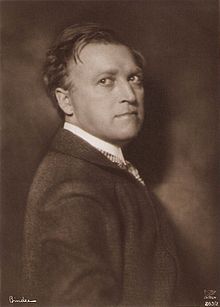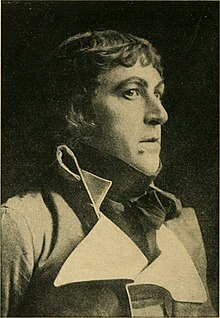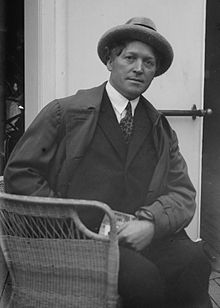Werner Krauss
Werner Krauss | |
|---|---|
 Krauss about 1920 | |
| Born | Werner Johannes Krauß 23 June 1884 |
| Died | 20 October 1959 (aged 75) |
| Occupation | Actor |
| Years active | 1902–1959 |
| Spouses | Paula Saenger
(m. 1908; div. 1930)Liselotte Graf
(m. 1940) |
| Awards | Staatsschauspieler (1934) Goethe-Medaille für Kunst und Wissenschaft (1938) Order of Merit of the Federal Republic of Germany (1954) Iffland-Ring (1954) Decoration of Honour for Services to the Republic of Austria (1955) |
Werner Johannes Krauss (Krauß in German; 23 June 1884 – 20 October 1959) was a German stage and film actor. Krauss dominated the German stage of the early 20th century. However, his participation in the
Early life
Krauss was born at the parsonage of Gestungshausen bei
Acting career

In 1903 he debuted at the
.By the agency of
in 1916 he also pursued a career as a film actor.Krauss' first film role was in
In 1924 Krauss continued his theatre career by joining the ensemble of the
Krauss' consummate skills in characterization earned him the title of "the man with a thousand faces".[1][failed verification] His fellow actress Elisabeth Bergner called him "the greatest actor of all time" and a "demonic genius" in her memoirs. Oskar Werner, born Oskar Josef Bschließmayer, chose his stage name in Krauss' honour.
Nazi Germany

Krauss was an unapologetic
Krauss and Max Reinhardt worked together for the last time at the 1937
Postwar
After the war, Krauss had to leave his home in Mondsee near Salzburg and was expelled from Austria. He also was banned from performing on stage and in films in Germany. His films were proscribed and he was ordered to undergo a denazification program from 1947 to 1948, whereafter he could return to Austria to become a naturalized citizen. In 1950, he again performed as King Lear at the Ruhr Festival in Recklinghausen. However, in December his performance with the Burgtheater ensemble at the Kurfürstendamm Theatre in Berlin met with protest.
In 1951 Krauss again received
Krauss died in relative obscurity in
Filmography
- Die geheimnisvolle Villa (1914)
- Tales of Hoffmann (1916) as Conte Dapertutto
- Zirkusblut (1916) as Thomas the tramp
- Die vertauschte Braut (1916, Short)
- Die Rache der Toten (1916, Short) as Mayor Paul Horvath
- The Uncanny House (1916, 3 parts) as Albert von Sievers / Franz Mollheim / Professor Cardallhan
- Die Bettlerin von St. Marien (1916) as Buckeljörg
- Unheilbar (1917)
- Der Erbe von 'Het Steen' (1917)
- A Night of Horror (1917): as the artist's husband
- Das Bacchanal des Todes (1917) as Jan Lars
- Die Kaukasierin (1917)
- Die Fremde (1917) as Pan Hoang Amitaba
- Die Pagode (1917) as Dr. Remus
- Gesühnte Schuld (1917, Short) as Professor Marquardt
- Die Tochter der Gräfin Stachowska (1917) as Adam Kolinski
- The Sea Battle (1917)
- Die schöne Prinzessin von China (1917, Short) as Kaiser
- Wenn Frauen lieben und hassen (1917, Short)
- Der Friedensreiter (1917) as Reiter
- Die schleichende Gefahr (1918) as Musiker
- Let There Be Light (1918) as Waldemar Gorsky
- Der Bettler von Savern (1918)
- Das verwunschene Schloß (1918) as Bauer Grödner
- Der Prozeß Hauers (1918)
- Diary of a Lost Woman (1918) as Meinert
- Madame d'Ora (1918) as Gelehrter Edmund Hall
- Colomba (1918) as Gonzales
- The Story of Dida Ibsen (1918) as Philipp Galen
- Fräulein Pfiffikus (1918)
- Seiner Hoheit Brautfahrt (1918)
- Seelen in Ketten (1918) as the prince
- E, der scharlachrote Buchstabe (1918)
- Das Gift der Medici (1918)
- Der Friedensreiter (1918)
- Opium (1919) as Nung-Tschang
- Prostitution (1919) as Mann
- Mazeppa, der Held der Ukraine (1919) as Mazeppa
- Die Insel der Glücklichen (1919) as Senator Dr. Wenningx
- Rose Bernd (1919) as Bernd
- Das ewige Rätsel (1919) as Faun
- The Dance of Death (1919) as The Cripple
- Phantome des Lebens (1919)
- Die Heimat (1919)
- The Woman with Orchids (1919)
- The Girl and the Men (1919)
- Opfer (1920)
- The Cabinet of Dr. Caligari (1920) as Dr. Caligari
- Spiritismus (1920)
- Eternal River (1920) as a ferryman
- Johannes Goth (1920) as Verleger Assmann
- The Woman Without a Soul (1920) as Stephan Wulkowitz
- Death the Victor (1920) as Dr. Olaf Karsten
- Die Frau im Himmel (1920) as Aufseher
- Der Staatsanwalt (1920) as Ziegelpeter
- The Brothers Karamazov (1920) as Serdjakoff
- The Kwannon of Okadera (1920) as Harlander
- Die Beichte einer Toten (1920)
- Das lachende Grauen (1920)
- The Medium (1921)
- The House in Dragon Street (1921) as Walter
- Christian Wahnschaffe (1921, part 2) as Niels Heinrich
- Robespierre
- Shattered (1921, dir. Lupu Pick) as the track checker
- The Story of Christine von Herre (1921) as Count Von Herre
- The Dance of Love and Happiness (1921) as Director Mac Sullivan
- Lady Hamilton (1921) as Lord William Hamilton
- Circus of Life (1921) as Philipp Hogger
- Sturmflut des Lebens (1921)
- Fledermäuse (1921)
- Die Beute der Erinnyen (1922) as Wells
- Fridericus Rex (1922-1923, part 1, 3) as Count Kaunitz
- Othello (1922, dir. Dimitri Buchowetzki) as Iago
- The Burning Soil (1922) as Old Rog
- Luise Millerin (1922) as Secretary Wurm
- The Earl of Essex (1922)
- Nathan the Wise (1922) as Nathan
- Marquise von Pompadour (1922)
- Josef und seine Brüder (1922)
- Die Nacht der Medici (1922)
- The Treasure (1923, dir. G. W. Pabst) as Svetelenz
- Old Heidelberg (1923) as Dr. Jüttner
- The Misanthrope (1923)
- Adam and Eve (1923)
- Between Evening and Morning (1923)
- Fräulein Raffke (1923) as Emil Raffke
- The Merchant of Venice (1923) as Shylock
- The Ancient Law (1923) as Professor Nathan
- The Doll Maker of Kiang-Ning (1923)
- Pontius Pilatus
- The Unknown Tomorrow (1923) as Marc Muradock
- Decameron Nights (1924) as Soldan
- Spring-Heeled Jack
- Une femme dans la nuit (1924)
- Wood Love (1925) as Bottom
- Reveille: The Great Awakening (1925)
- Joyless Street (1925, dir. G. W. Pabst) as Geiringer the butcher
- Jealousy (1925) as Mann/Georges Ménard
- The Morals of the Alley (1925) as a wholesaler
- The Dealer from Amsterdam (1925) as Arent Bergh
- Variety (1925)
- Friedrich Wilhelm Murnau) as Orgon
- The Woman from Berlin (1925) as Anton Zöllner
- The House of Lies (1926) as Hjalmar Ekdal
- Secrets of a Soul (1926, dir. G. W. Pabst) as Martin Fellman
- Nana (1926, dir. Jean Renoir) as Count Muffat
- The Woman's Crusade (1926) as The Idiot
- Maria, die Geschichte eines Herzens / Das graue Haus (1926) as Vater
- The Student of Prague (1926, dir. Henrik Galeen) as Scapinelli
- Superfluous People (1926) as Constable Suka
- One Does Not Play with Love (1926) as Prince Colalto
- Excluded from the Public (1927) as Ibrahim Hulam
- The Vice of Humanity (1927) as Willibald Cooks
- The Trousers (1927) as Theobald Maske
- Da hält die Welt den Atem an / Maquillage (1927) as Morris Broock
- Radio Magic (1927) as Theophil Schimmelpfenning
- Die Hölle der Jungfrauen (1928) as Mystkowski
- Looping the Loop (1928) as Botto the clown
- The Merry Farmer (1929) as Bauer Mathäus Reuther
- Thou Shalt Not Kill (1929) as Prof. Marquardt
- Napoleon at Saint Helena (1929) as Napoleon
- Yorck (1931) as General Yorck von Wartenberg
- Man Without a Name (1932) as Heinrich Martin
- 100 Tage (1935) as Napoleon
- Court Theatre (1936, dir. Willi Forst) as Friedrich Mitterer
- Robert Koch (1939, dir. Hans Steinhoff) as Rudolf Virchow
- Der letzte Appell (1939)
- Jud Süß (1940, dir. Veit Harlan) as Rabbi Loew / Secretary Levy / Isaak / Old Jewish Man
- Annelie (1941) as Katasteramtsrat Reinhold Dörensen
- Between Heaven and Earth (1942) as Justus Rottwinkel
- Die Entlassung (1942) as Privy Councillor von Holstein
- Paracelsus (1943, dir. G. W. Pabst) as Paracelsus
- Bonus on Death (1943) as Dr. Schmidt
- The Falling Star (1950) as Lenura / Lenoir
- Son Without a Home (1955) as Wilhelm Hartmann
- Das verräterische Herz (1958, TV Short) as the old man (final film role)
References
- ISBN 978-0-674-57640-7. Retrieved 9 November 2011.
- ISBN 978-0-313-29516-4. Retrieved 3 November 2011.
Gottfried (Reinhardt) refers to Krauss as (an) "unashamed anti-Semite"
- ^ ISBN 978-1-57181-655-9. Retrieved 1 November 2011.
